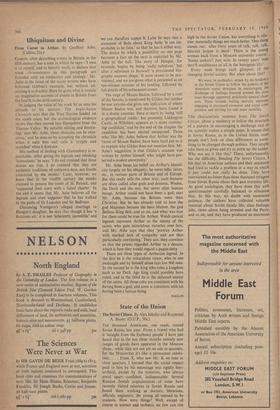Ubiquitous and Divine
From Caesar to Arthur. By Geoffrey Ashe. (Collins, 21s.) GIBBON, after describing events in Britain in the fifth century, has a note in which he says—'I owe it to myself, and to historic truth, to declare that some circumstances in this paragraph are founded only on conjecture and analogy.' Mr. Ashe is the latest of the many writers who have followed Gibbon's example, but without ad- mitting it so frankly. Here he gives what is mainly an imaginative account of events in Britain from the fourth to the sixth century.
In judging the value of his work let us note his attitude to his sources. The Anglo-Saxon Chronicle says that the West Saxons landed on the south coast, but the archazological evidence shows that they moved into Hampshire from the Thames Valley. 'By suitable editing and theoris- ing,' says Mr. Ashe, 'these obstacles can be over- come,' and he does so by accepting the chronicle when it suits him and calls it 'cryptic and muddled' when it does not.
His method of dealing with Glastonbury is re- markable. After giving the legends and rebuking Iconoclasts,' he says, 'I do not contend that these stories are true. I do contend that they are authentic traditions of unknown date, not frauds concocted by the monks.' Later, however, we learn that in the twelfth century the monks claimed to possess the tomb of St. Patrick, and 'supported their story with a faked charter.' In the end it seems that Mr. Ashe believes all the legends and even supposes that he has walked in the paths of Sir Lancelot and Sir Bedivere.
Discussing Vortigern's alleged marriage to !Hengist's daughter, he says that though it has 'a fictitious air,' it is not 'inherently incredible' and
we can therefore accept it. Later he says that a statement of Bede about King Aelle 'is too im- probable to be false,' so that he has it either way. The device by which a possibility on one page becomes a fact on the next is exploited by Mr. Ashe to the full. The story of Hengist, for example, begins by being 'sadly nebulous,' but after a reference to Beowulf 'a provisional bio- graphy assumes shape.' It soon ceases to be pro- visional, and we are given what is presented as an eye-witness account of his landing, followed by full details of his subsequent career.
The siege of Mount Badon, followed by a rout of the Saxons, is mentioned by Gildas, but neither he nor anyone else gives any indication of where Mount Badon was, and theorists have found it in a dozen counties. Here it starts by being 'still a geographical riddle,' but presently Liddington Castle, in Wiltshire, appears as 'a more convinc- ing candidate,' and by the end of the chapter the candidate has been elected unopposed. Those who, like Mr. Ashe, believe that Arthur was the victor of Mount Badon, have been hard put to it to explain why Gildas does not mention him. Mr. Ashe's suggestion is that Gildas's account was written by Arthur himself, who 'might have pre- served a modest anonymity.'
Mr. Ashe bases his belief on Arthur's histori- city largely on his ubiquity; he owns hills, caves, etc., in various parts of Britain and of Europe. But this really tells the other way; such features are often called after gods and demons, Woden, the Devil and the rest, but never after human beings. Arthur could not have been a god, says Mr. Ashe, because the Britons were then Christian. But he has already told us how the god Maponus became the hero Mabon, the god Belinus King Beli, and so on, and what was true for them could be true for Arthur. Welsh clerical legends represent Arthur as the enemy of the saints, who gain miraculous victories over him, and Mr. Ashe says that they 'portray Arthur with marked lack of sympathy and are thus particularly convincing.' They are; they convince us that the priests regarded Arthur as a demon, which is how they would regard a pagan deity.
There are three types of Arthurian legend. In the first he is the miraculous victor, who in one onslaught and by himself alone lays low 960 men. In the second he is the king who rules a kingdom such as no Dark Age king could possibly have ruled, and in the third he is the defeated enemy of the saints. All these roles are consistent with his having been a god, and none is consistent with his having been a human being.
RAGLAN






































 Previous page
Previous page